The holiday season is approaching, Christmas markets start popping up everywhere in Vienna ; lights, Christmas decorations and candles begin dressing the city and the window displays for the festive season. We feel it in the air as well: the cold winds of winter. Maybe the first snow flakes that fall on to the earth, the excitement of the kids for gifts, the warmth of family time and the rushing energy that comes with the last month of the year. It’s a magical time of the year but it tends to be stressful for most of us, as we find ourselves racing to the shops for gifts for the people we love.
Maybe before all this rushing begins, we can pause and ask ourselves: What are we grateful for? What has this year given us that we can really feel thankful for? What are the situations, people, and experiences that have brought us to where we are right now? Can we be grateful to those persons, those events, the emotions and thoughts that have shaped us this year and brought us to where we are standing nowadays? Even if they were good or bad, positive or negative. All those experiences have happened for a reason. They have taught us valuable lessons and have brought us to this very present moment.
So before we rush into the holiday season, thinking about the presents we need to buy and the gifts that we expect to receive – before we all fall into this trap of consumption and consumerism – can we just take a moment, to sit, breathe and reflect about everything that we already have. And take that abundance to make ourselves feel truly grateful for? Can we cultivate an attitude of gratitude towards our own life and share ourselves from this place of peace and compassion with the world?
I think we can 🙂
In order to create this attitude we need to understand, what is Gratitude actually?
According to Angeles Arriens book Living in Gratitude: A Journey That Will Change Your Life: “Gratitude is essentially the recognition of the unearned increments of value in one’s experience—the acknowledgment of the positive things that come our way that we did not actively work toward or ask for.” The International Encyclopedia of Ethics defines gratitude as well as “the heart’s internal indicator on which the tally of gifts outweighs exchanges,” a definition that echoes the notion of unearned increments. The connection to the concept of gifts is a natural one. The Latin root of the word gratitude is grata or gratia—a given gift—and from this same root we get our word grace, which means a gift freely given that is unearned.
Gratitude is a feeling that spontaneously emerges from within. However, it is not simply an emotional response; it is also a choice we make. We can choose to be grateful, or we can choose to be ungrateful—to take our gifts and blessings for granted. As a choice, gratitude is an attitude or disposition.
David Steindl-Rast, the Benedict monk born here in the city of Vienna who is committed to interfaith dialogue, says that: “Gratefulness/Gratitude is the key to a happy life that we hold in our hands, because if we are not grateful, then no matter how much we have we will not be happy — because we will always want to have something else or something more”.
Why is Gratitude important?
Gratitude is part of the humans natural behavior to relate and connect to others. The expression of gratitude continues to be the glue that consistently holds society and relationships together; its opposite – ingratitude – contributes to societal dissolution and separation. The expression of gratitude is essential to humankind’s sustainability and survival. Gratitude’s stabilizing and healing effects, which have been researched from multiple standpoints—cultural, psychological, physical, spiritual, even financial—have made it abundantly clear that the benefits of living a grateful life are irrefutable.
If gratitude is a state of being that is essential to a life well lived, why then, in modern times, do we not cultivate and express it on a daily basis? After all, giving thanks and expressing appreciation for the blessings and gifts of life is a natural human response. We learn this as kids when our parents teach us to say thanks when we get an object, a gift or even food. So how come we have forgotten to be grateful? Perhaps the key reason we do not make gratitude a part of our daily lives is that the accelerated pace and multiple distractions of modern life have simply made it all too easy to forget gratitude’s importance. This happens particularly in the holiday season, as we find ourselves stressed about all the things we need to do before the year ends, and the distractions that advertisements, shops and media play specially during this time, makes it harder for us to have the time to reflect and think about everything that makes us feel grateful and whole.
Through conscious and sustained practice over a period of time, we can discover again how gratitude and all its related qualities—thankfulness, appreciation, compassion, generosity, grace, and so many other positive states—can become integrated and embodied in our lives. And when people in great numbers choose to practice, integrate, and embody gratitude, the cumulative force that is generated can help create the kind of world we all hope for and desire, for ourselves and for future generations (Angeles Arriens from her book Living in Gratitude: A Journey That Will Change Your Life)
How can we cultivate an Attitude of Gratitude?
There are numerous tools that can help us to develop an Attitude of Gratitude. But for that to succeed we need to be consistent, present and patience with ourselves.
Here there are 3 ways that can help you to cultivate an Attitude of Gratitude:
- Write it down: Start a gratitude journal/keep a gratitude list. Whatever you feel grateful for, write it down! Take a moment or two during the day, maybe at the beginning when you are having your morning coffee or tea; or at the end of the day before going to bed, and use this moment to sit down and write: Why do you feel grateful for today?. Try to be specific about what you are really thankful for, give people names, locations, events, and note the things that make you feel in this way. Some days you will feel that the list is short, other days your hand will keep writing pages and pages about all the things that make you feel grateful. But in the end you will always find at least one thing that you can feel thankful for. Allow this process to be as natural as possible, don’t force it, it will become easier over time. Just hang on and keep trying.
2. Meditate: Wether you meditate or not, see if you can take a couple of minutes a day to think about the things that you are truly grateful. Try to find a quiet moment during the day where you can do this, maybe on your coffee break at work, at the tram stop waiting for the next tramway, walking back home after a long day, etc. Take a couple of deep breaths first to connect and ground yourself. Then try to bring to your mind those situations, people and things that were present today, this week or this month, and that they give you a sense of being happy, positive and thankful for. Bring that person to your mind, bring that moment of the day when you felt good, bring that thing/object that makes your life easier today. Imagine your life full with blessings, I’m sure you will end up with a smile on your face.
- Express it: Say it out loud, express your happiness and joy to the world, but really mean it! Find that person who has made a difference in your life and tell them how grateful you are. Write a note to a long lost friend or family member, thanking them for the time they’ve spent with you. Hold in your hands or arms those things that help you daily and that make life more enjoyable. Pay attention to the air you breathe, the water you drink, the shelter above your head, say thank you for those things that we normally take for granted and that without them we could live the way we do. Be thankful for the gift of Life and say it out loud.
Give it a try. Allow yourself to begin this last month of the year being positive and grateful. Feeling thankful and craving less, allowing this Attitude of Gratitude to guide you into the new year.
The Bali Yoga Team wishes you Happy Holidays! and wants to thank you for all of your efforts, for showing to yourself on your mat, and for allowing us to guide you in this process of evolution, of growth, of conscious expansion of the heart!
Namaste!
Text by Jonathan Rivas
Grateful Living Practice: Stop, Look, Go!

